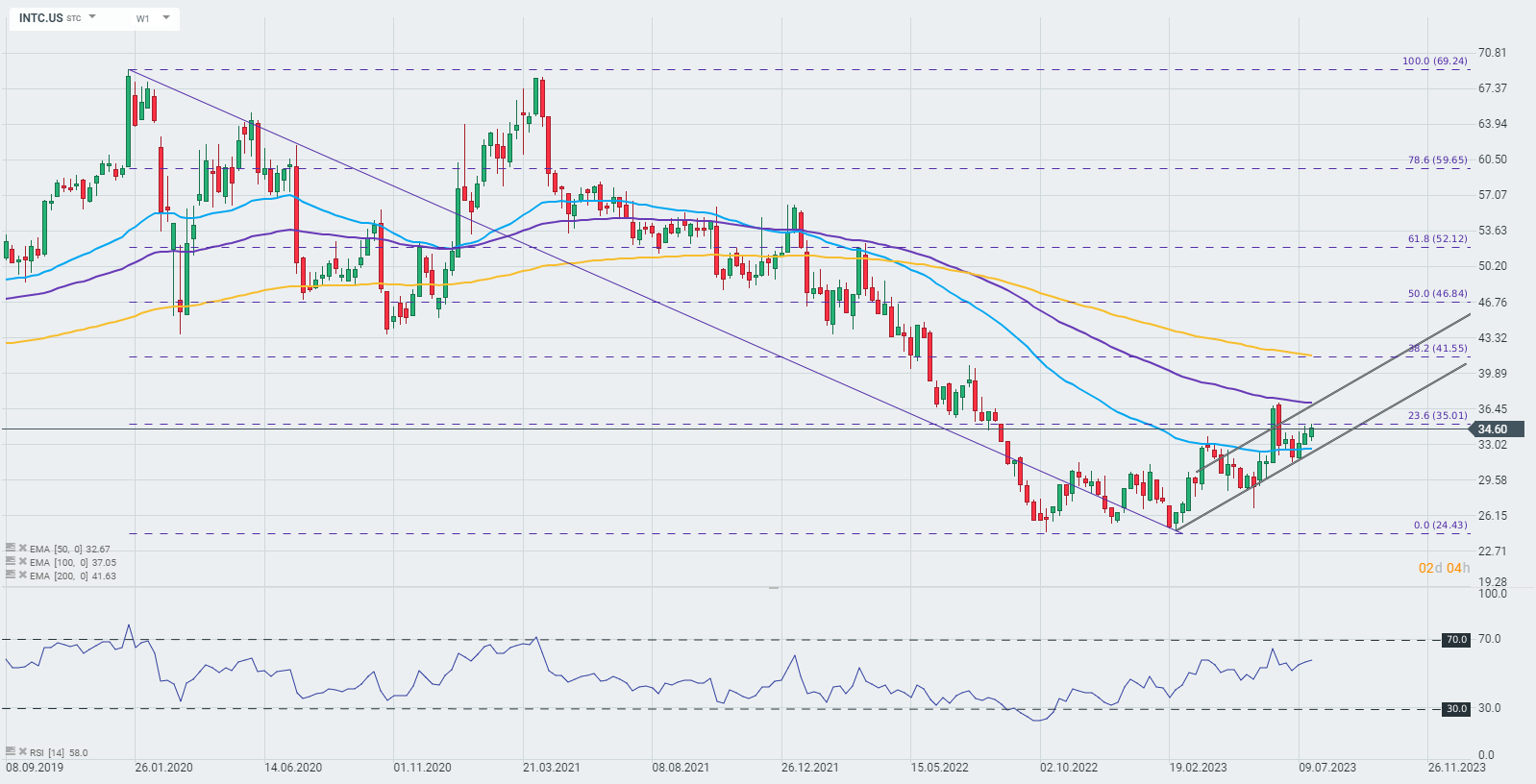Intel (INTC.US) is one of the leading manufacturers of personal computer (PC) processors. It will report results after today's US session. Investors will remain vigilant as Q1 revenues fell 36% y/y. The report could be important for the PC industry as well as the AI trend because Wall Street is concerned that growing demand for chips dedicated strictly to artificial intelligence may not be sustainable for many companies due to slowing demand for all other chips, which are facing oversupply from 2020-2021. Taiwan Semiconductors' recent results cast doubt on Intel's report. Wall Street expects a y/y revenue decline and a flat k/k reading. However, forecasts will be key.
Revenues: $12.1 billion (FactSet) vs. $11.7 billion in Q1 and $15.32 billion in Q2 2022
Earnings (loss) per share (EPS): Loss of $0.04 per share vs. $0.03 loss in Q1 and $0.29 profit in Q2 2022
Oversupply weighs on sentiment
- Intel's forecasts estimated Q2 revenue of $11.5 to $12.5 billion so Wall Street estimates are roughly in the middle of the company's forecasts. Intel's Q1 gross margin was -37.5% vs. 50.4% in Q1 2022, which perfectly illustrates the cyclical nature of the industry - any result better than that in Q1 can be viewed relatively positively.
- One of Intel's main problems is the decline in processor sales after a spike during the pandemic, when increased PC sales resulted from lockdowns and remote work. Since last year sales of chips for laptops have fallen 43%, and PC sales is down roughly 30% y/y. Potentially, sentiment could be improved not by the report itself since the slowdown is almost obvious but by the forecast of a rebound in demand in the second part of the year with inventories and oversupply slowly disappearing at the same time.
- The company's business is particularly exposed on the side of weaker consumer (lower PC sales). In Q1, as many as four of the company's five divisions posted significant revenue declines. The exception was Mobileye, which is listed as a separate company and where we already know that results were solid. Intel retained a significant 88% stake in the automotive chipmaker.
Strong competitors and lack of competitive AI chips offer
- A potential risk for the company could be an increase in corporate spending on the data center infrastructure needed for AI (graphics chips for artificial intelligence). This could potentially undermine corporate demand for Intel's processors. Susquehanna analysts have indicated that they are also cautious about the competitiveness of Intel's server portfolio growth over a horizon of several years. Last week, the president of TSMC, a Taiwan-based contract chipmaker, indicated that demand for AI chips is projecting lower sales of traditional chips (which make up the bulk of Intel's sales).
- The company's shares are up nearly 30% year-to-date, not much against other chipmakers - the sector is having a historically record half-year. Intel failed to beat revenue estimates in three of the last four quarters. Analysts cite delays in major products, weakness in AI data center offerings, and loss of market share to major competitor AMD and Nvidia, Marvell or Broadcom. However some analysts reassure that the weakness of AI's offering so far could result in a postponed share price increase if the company unveils a broader plan and expands it more, which is not yet reflected in the share price.
 Source: xStation5
Source: xStation5

Gazdasági naptár: NFP-adatok és amerikai olajkészlet-jelentés 💡

Live Trading - 2026.02.10.

🌍 Gyorsjelentési szezon az XTB-vel

🌍 Gyorsjelentési szezon az XTB-vel
Ezen tartalmat az XTB S.A. készítette, amelynek székhelye Varsóban található a következő címen, Prosta 67, 00-838 Varsó, Lengyelország (KRS szám: 0000217580), és a lengyel pénzügyi hatóság (KNF) felügyeli (sz. DDM-M-4021-57-1/2005). Ezen tartalom a 2014/65/EU irányelvének, ami az Európai Parlament és a Tanács 2014. május 15-i határozata a pénzügyi eszközök piacairól , 24. cikkének (3) bekezdése , valamint a 2002/92 / EK irányelv és a 2011/61 / EU irányelv (MiFID II) szerint marketingkommunikációnak minősül, továbbá nem minősül befektetési tanácsadásnak vagy befektetési kutatásnak. A marketingkommunikáció nem befektetési ajánlás vagy információ, amely befektetési stratégiát javasol a következő rendeleteknek megfelelően, Az Európai Parlament és a Tanács 596/2014 / EU rendelete (2014. április 16.) a piaci visszaélésekről (a piaci visszaélésekről szóló rendelet), valamint a 2003/6 / EK európai parlamenti és tanácsi irányelv és a 2003/124 / EK bizottsági irányelvek hatályon kívül helyezéséről / EK, 2003/125 / EK és 2004/72 / EK, valamint az (EU) 2016/958 bizottsági felhatalmazáson alapuló rendelet (2016. március 9.) az 596/2014 / EU európai parlamenti és tanácsi rendeletnek a szabályozási technikai szabályozás tekintetében történő kiegészítéséről a befektetési ajánlások vagy a befektetési stratégiát javasló vagy javasló egyéb információk objektív bemutatására, valamint az egyes érdekek vagy összeférhetetlenség utáni jelek nyilvánosságra hozatalának technikai szabályaira vonatkozó szabványok vagy egyéb tanácsadás, ideértve a befektetési tanácsadást is, az A pénzügyi eszközök kereskedelméről szóló, 2005. július 29-i törvény (azaz a 2019. évi Lap, módosított 875 tétel). Ezen marketingkommunikáció a legnagyobb gondossággal, tárgyilagossággal készült, bemutatja azokat a tényeket, amelyek a szerző számára a készítés időpontjában ismertek voltak , valamint mindenféle értékelési elemtől mentes. A marketingkommunikáció az Ügyfél igényeinek, az egyéni pénzügyi helyzetének figyelembevétele nélkül készül, és semmilyen módon nem terjeszt elő befektetési stratégiát. A marketingkommunikáció nem minősül semmilyen pénzügyi eszköz eladási, felajánlási, feliratkozási, vásárlási felhívásának, hirdetésének vagy promóciójának. Az XTB S.A. nem vállal felelősséget az Ügyfél ezen marketingkommunikációban foglalt információk alapján tett cselekedeteiért vagy mulasztásaiért, különösen a pénzügyi eszközök megszerzéséért vagy elidegenítéséért. Abban az esetben, ha a marketingkommunikáció bármilyen információt tartalmaz az abban megjelölt pénzügyi eszközökkel kapcsolatos eredményekről, azok nem jelentenek garanciát vagy előrejelzést a jövőbeli eredményekkel kapcsolatban.


